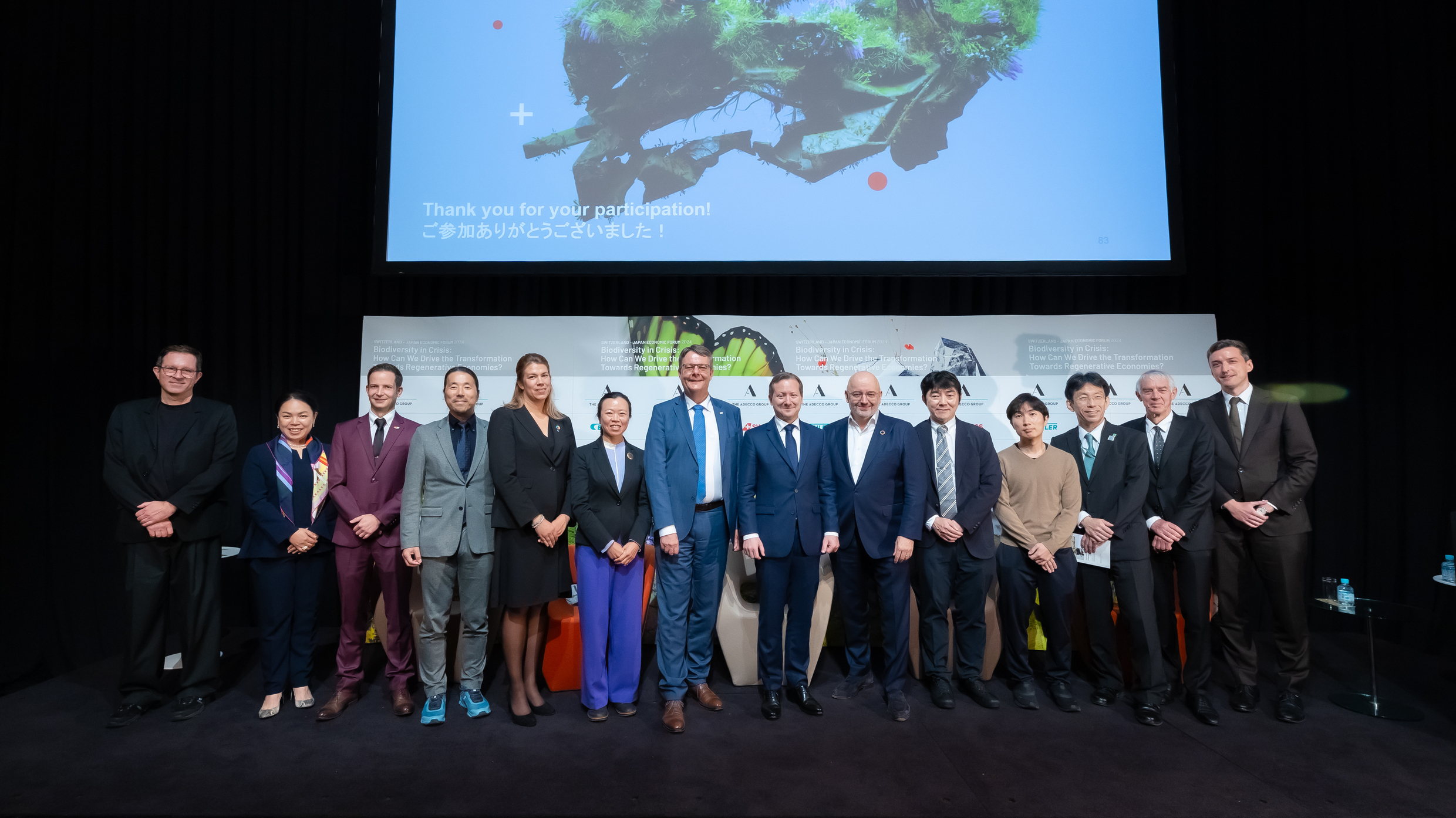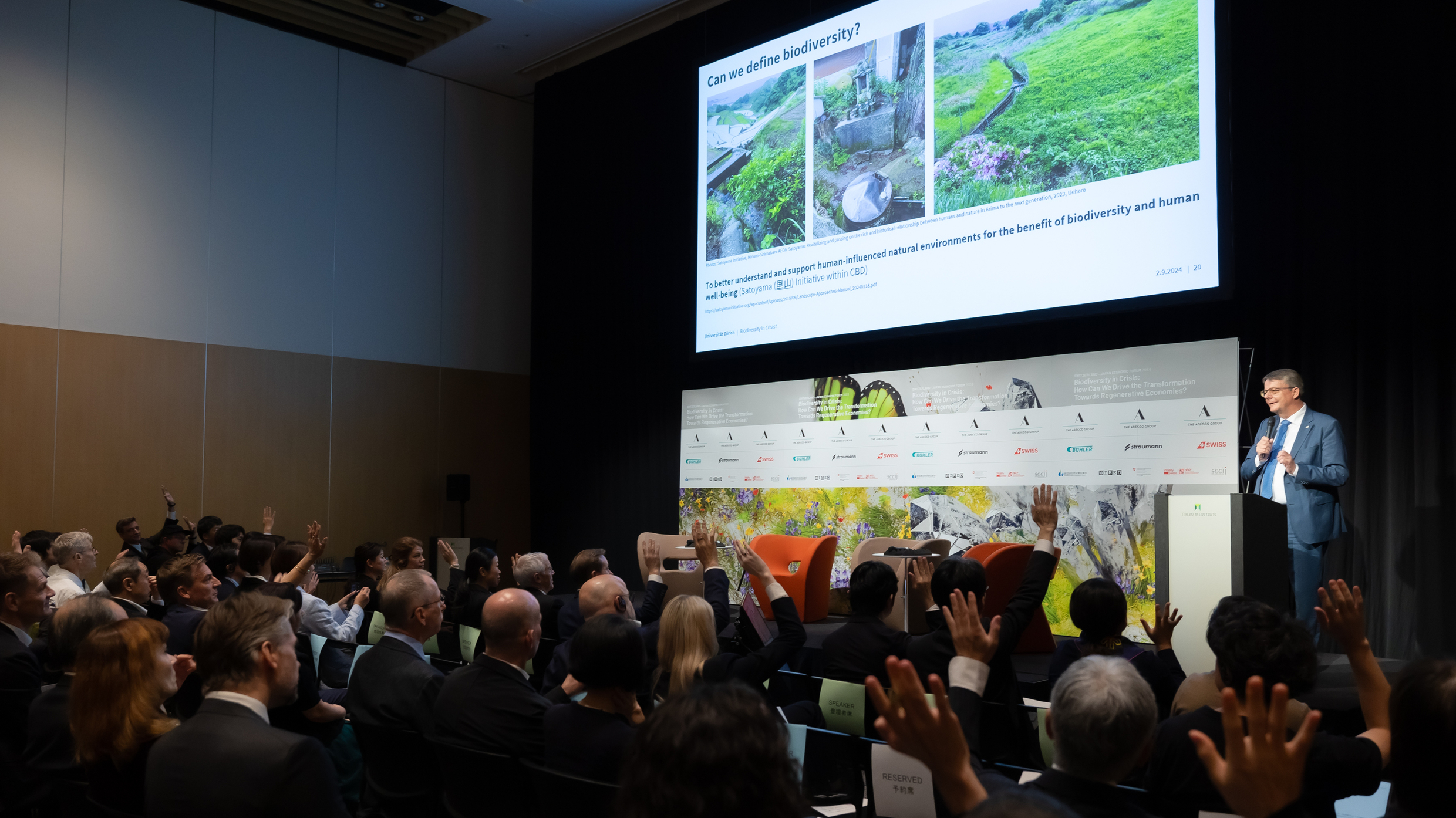UZH at the Switzerland-Japan Economic Forum 2024
The Switzerland-Japan Economic Forum 2024, held in Tokyo and organized by the Embassy of Switzerland in Japan and the Swiss Chamber of Commerce and Industry in Japan, brought together business leaders, policymakers, and academics to discuss shared economic interests and challenges, with a particular focus on biodiversity's role towards a nature-positive economy. UZH President Michael Schaepman contributed with a keynote address and participated in a panel discussion.
Biodiversity in crisis: How can we drive the transformation towards regenerative economies?
In his keynote speech, UZH President Michael Schaepman highlighted the critical role of biodiversity in economic stability. Biodiversity—the variety of plants, animals, and microorganisms—is essential to maintaining ecosystems that provide food, water, and health resources. However, Michael Schaepman explains that the definition of biodiversity can vary between cultures, meaning that there is a fundamental difference in our cultural aptitude towards biodiversity.
By referencing the Kunming-Montreal Global Biodiversity Framework (GBF), an international agreement that sets targets for protecting natural resources and promoting sustainable production and the Taskforce on Nature-related Financial Disclosures (TNFD), he further discussed frameworks and policies which guide companies to assess and report their impact on nature. He noted the significance of these nature-related financial disclosures as a tool for mitigating biodiversity risks, representing an important step toward integrating nature into financial decision-making. Schaepman further argued that current economic models fail to attribute value to life itself and emphasized the need to change these models, supporting a transformation toward a nature-positive economy.
How to move from commitment to actions

Following the keynote address, the Forum included two panel discussions, consisting of representatives from industry and academia. The first panel focused on navigating evolving standards, targets and incentives, while the second panel focused on challenges, opportunities and innovation in regenerating nature. The second panel, in which Michael Schaepman participated, offered practical advice for companies moving from pledges to tangible actions on biodiversity and introduced innovative solutions that can support biodiversity and climate goals, such as (ARES) initiative. This research platform uses cutting-edge technology to monitor and better understand Earth’s ecosystems, underscoring the role of innovation in fostering a sustainable, nature-positive economy.
UZH’s contribution to biodiversity research
UZH is highly engaged in biodiversity research through the University Research Priority Program (URPP) on Global Change and Biodiversity. This interdisciplinary program brings together experts from various fields to investigate biodiversity loss and develop sustainable management practices. By contributing scientific insights and innovative approaches, UZH supports efforts to integrate biodiversity into business and policy. Additionally, the URPP, in collaboration with the international research network bioDISCOVERY, organizes the World Biodiversity Forum, which focuses on translating scientific knowledge into practical solutions for biodiversity conservation and sustainable transformation.
Collaboration between UZH and Japan
Beyond the Forum, UZH maintains many research collaborations with Japanese partner institutions. One highlight is the strategic partnership with Kyoto University, focusing on collaborative research across disciplines such as health, biodiversity, and artificial intelligence (AI). Within this partnership, a notable project, co-led by UZH Professor Kentaro Shimizu, focuses on developing climate-resilient wheat varieties to support a “second green revolution.” This initiative aims to enhance food security in the face of changing environmental conditions. Such collaborations reflect UZH’s commitment to global engagement and its role in addressing global challenges through academic research and international cooperation.
The Switzerland-Japan Economic Forum highlighted the importance of collaborative approaches to biodiversity and its implications for economy, showing how joint efforts between Switzerland and Japan and can drive transformation and inspire innovative solutions towards a nature-positive economy.
Tiffany Merz-Cheok

.jpg)




